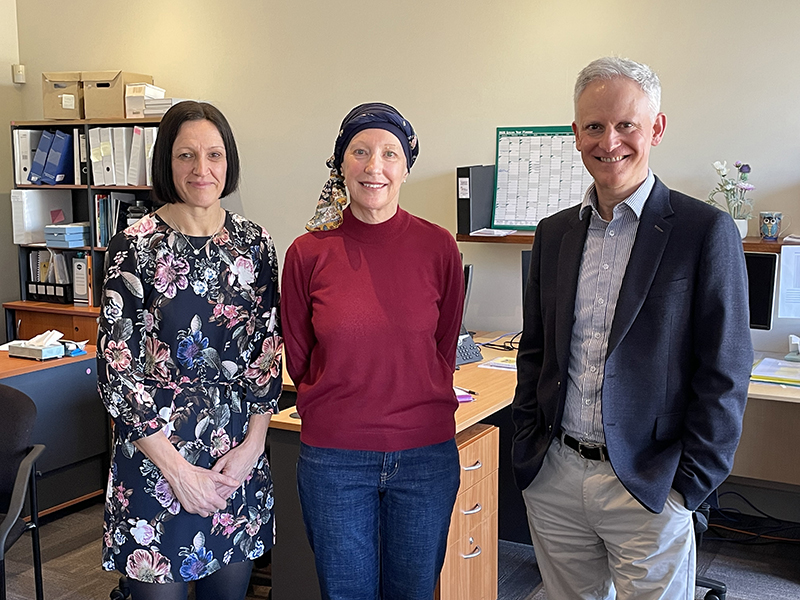Study to test need for in-person follow up
 Consultant Gynaecologist Professor Paul Cohen, study nurse Issy Black and patient Susan
Consultant Gynaecologist Professor Paul Cohen, study nurse Issy Black and patient Susan
WA health-led research is testing the need for in-person follow-up appointments for women who have undergone initial treatment for ovarian cancer.
And it could pave the way for a whole new patient-centred-approach to follow-up care.
The study will determine whether regular nurse-led video call appointments – in conjunction with a blood test and questionnaire – could provide a safe and effective alternative to standard in-person clinic consultations with the patient’s treating doctor.
Women and Newborn Health Service Consultant Gynaecologist
Professor Paul Cohen, who is heading the project, said the study had the potential to transform the way ovarian cancer patients – and possibly patients with some other types of cancer – were monitored following initial rounds of treatment.
‘If we can show that this alternative approach to follow-up care does not compromise our ability to detect cancer recurrence and that it is as effective at managing a patient’s psychosocial symptoms and late effects of treatment, then we could consider offering it more widely,’ he said.
‘This is the sort of thing we are referring to when we talk of patient-centred care and it might also prove to be an option for patients receiving follow-up care for other types of cancer.’
Professor Cohen said the idea for his research was sparked by a query from an ovarian cancer patient who had flown 1000km to attend a monitoring appointment.
‘She asked me why she had needed to fly to Perth to see us face to face,’ he explained.
‘I told her that that was a really good question and that it was just the way things had always been done.’
It led him to consider whether face-to-face appointments were the only – or even optimal – way of monitoring for cancer recurrence and managing ongoing effects of treatment or psychosocial issues related to the patient’s cancer.
Professor Cohen’s project the ‘Measure of Ovarian Symptoms and
Treatment’ concerns in follow up – MOST for short – is being run in four states – Western Australia, New South Wales, Queensland and Victoria.
It is aiming to enrol 40 patients who will participate in the study for a period of up to 24 months, or until their cancer returns.
Patients participating in the study will be randomised to either the nurse-led intervention or a control group. Patients in the latter will receive standard care in the form of an in-clinic appointment with their treating physician every three months.
Study nurse Issy Black, who is conducting the nurse-led appointments across Western Australia, said patients in her arm of the study seemed to welcome the continuity of having a single point of contact as well as the convenience of not having to physically attend appointments.
Ms Black said chemotherapy and other cancer therapies could be gruelling for patients who would typically have already spent many hours in clinical environments undergoing their treatments and tests.
‘Having had their lives put on hold for so long, they really appreciate not having to travel to and from appointments or find parking and spend long periods in waiting rooms,’ she said.
‘Most would rather be spending that time with family and friends or doing things they enjoy.’
Ms Black said this was especially the case for the roughly one third of ovarian cancer patients who lived in regional and remote parts of the country, for whom attending such appointments could be significantly disruptive.
‘If they don’t have family in Perth, they might need to arrange alternative accommodation and this can be especially hard if they are elderly, on their own or unwell,’ she explained.
Susan, an emergency department nurse at a major metropolitan hospital, was the first patient enrolled in the study.
She said she was grateful to have had the opportunity to take part in the project and was especially pleased when she learnt she had been randomised to its nurse-led arm.
‘It meant I could attend my follow-up appointments from the comfort of home,’ she said.
‘Even though I live in the metropolitan area, had I been receiving standard follow-up care, I would have had to leave home by 7am to get to these appointments and travel about an hour each way on the bus.
‘It could easily have been 5 hours out of my day – and even when you’re feeling well, attending these appointments can be really tiring so these days would be written off.’
Susan said another attraction of the nurse-led appointments was that they offered greater scheduling flexibility, making it easier for her to fit them around her work shifts.
The continuity of having one nurse for all appointments and slightly longer consultations were also drawcards.
Susan pointed out that had she not been assigned to the study’s nurse-led arm, she would likely have seen several different doctors through the course of her monitoring appointments by now.
‘During my six cycles of chemo, for instance, I saw three different doctors,’ she explained.
‘Having the same person all the way through makes the appointments seem more personal and creates an environment where you feel comfortable raising issues.
‘I felt sad when Issy reminded me that my last nurse nurse-led appointment would be in June (because that’s when my time in the study is up) and that future follow-ups would be as standard hospital appointments.
‘You build up a relationship with the nurse, and that’s the lovely part of it,’ she said.

